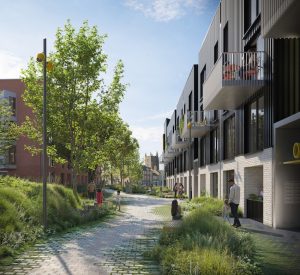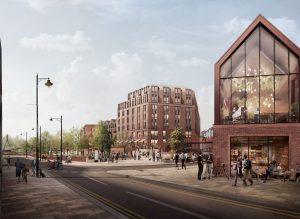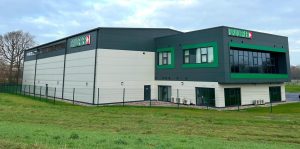Pioneering design schemes head RICS awards

A NEW college build in Birmingham has scooped the top prize at the annual Royal Institution of Chartered Surveyors’ West Midlands awards.
The relocation and regeneration of Joseph Chamberlain Sixth Form College, which was completed in 2009 by Nicholas Hare Architects, was the project that inspired judges most.
The new college, which serves inner city Birmingham, accommodates around 1,300 pupils and has a strong commitment to the local community offering a diverse range of facilities.
The regeneration scheme was designed to attract students wanting to work in a modern academic environment.
Now in their 20th year, the RICS awards are widely seen as an annual celebration of built environment projects that demonstrate excellence and commitment to sustainability and value for money.
The awards recognise West Midlands developments in four award categories – Building conservation, Community benefit, Regeneration and Sustainability.
Ian Pitt, RICS West Midlands regional chairman, said: “The judges felt that the success of this development project was evident through the positive effects that it has had on the pupils and staff who now work in this wonderful building.
“The sense of space and arrangement of seating and workstations is all of an exceptionally high standard and so the college really deserves this highly commended accolade.”
Taking top prize in the Sustainability category was the Smart Timber Frame Company, which is based in Stoke-on-Trent.

Since its development, the product has been put to a range of residential and commercial uses, including office and hotels but in particular for the self-build sector.
The system is able to provide developers with significant cost savings as only limited scaffolding and fall arrest costs need be incurred. Such is the success of the initial concept, there are now also sustainable new add-ons being trialed such as generating heat from the roof.
Mr Pitt said: “The judges felt that the development of such a unique and adaptable building concept such as the timber frame building system was truly remarkable and is therefore absolutely deserving of this highly commended accolade.”
The development of a new shop and post office located within the village of Barford in Warwickshire secured the coveted Community Benefit award.
The project, completed by Mike Sheard, was undertaken following the closure of the only shop in Barford. Villagers felt a shop was integral to local life, and set up an action group to help establish a new shop and Post Office.
After looking at over 30 possible locations, the community group decided to build the new shop as an extension to the existing village hall.
The new premises now also act as a permanent home to the Post Office, which in addition offers banking facilities and an internet café, as well as incorporating an outside play area.
The store employs two members of staff but is also manned by up to 80 local volunteers, acting as a village hub that is used by hundreds of people everyday.
Mr Pitt said: “The judges felt that the Barford Village Shop development project was an outstanding success story. It completely embodies the whole concept of community benefit and is therefore, highly deserving of the Community benefit award.”
In Shropshire, the new West Midlands Regional Food Academy in Newport was also recognised.

In the past, the old buildings had been used for farming storage, but as they had fallen into disrepair over recent years, the site was deemed suitable for an ambitious regeneration in order to restore the buildings back into their former glory.
Following an extensive restoration project, the modern buildings now house a food processing centre, a 100-seat lecture theatre and an exhibition hall as well as other multi-purpose facilities.
The site also helps deliver educational opportunities and technical and business support to the food and drink industry, particularly through partnership with local and regional businesses and education providers.
Mr Pitt said: “The judges felt the modern West Midlands Regional Food Academy was a well thought out, designed and executed project. Since completion, it has proved to be an outstanding success and therefore it is highly deserving of the regeneration award.”
The conversion of the Cross Street South housing development in Wolverhampton, previously a disused car park, into 30 new homes for affordable rent secured the Sustainability award for Bromford Group.
The development was recognised for incorporating practical options to reduce environmental impacts and improve standards of living for residents. Minimising construction and maintenance costs were also highlighted as important factors.
Environmentally friendly products, such as timber from sustainable sources, recyclable aluminium fascias and recycled newspaper for insulation, were used on the scheme where possible. The site also includes a biomass heating and hot water system, allotments and an eco-park and pavilion for local residents.
“The judges felt that the Cross Street South development project was built to an exceptionally high calibre and also recognised its attractive presentation and positive general feel,” said Mr Pitt.
“The properties offer a BREEAM eco homes rating of ‘Excellent’ and the central heating boiler, the capture of rainwater and recycling of waste were also particularly impressive. All these factors and more, mean that this development was highly deserving of the Sustainability award.”
The conservation of The Malthouse building, located within the grounds of Grade 1 listed manor house Harvington Hall, secured the Building Conservation award.
The Harvington Hall site includes, amongst other buildings, the Malthouse, which is individually Grade II listed and was previously an under-utilised storage building that had fallen into disrepair.
The building is half timbered with brick infill over a ground floor plinth constructed in locally quarried sandstone.
The restoration project, which was completed by Brownhill Hayward Brown Chartered Architects, used sound conservation techniques to upgrade the building for use by both visitors and school groups as an interpretation centre.

“The project has not only successfully retained many of the buildings original features, therefore helping to preserve the integrity of the Hall, but it has also helped to substantially improve the overall visitor experience.”











